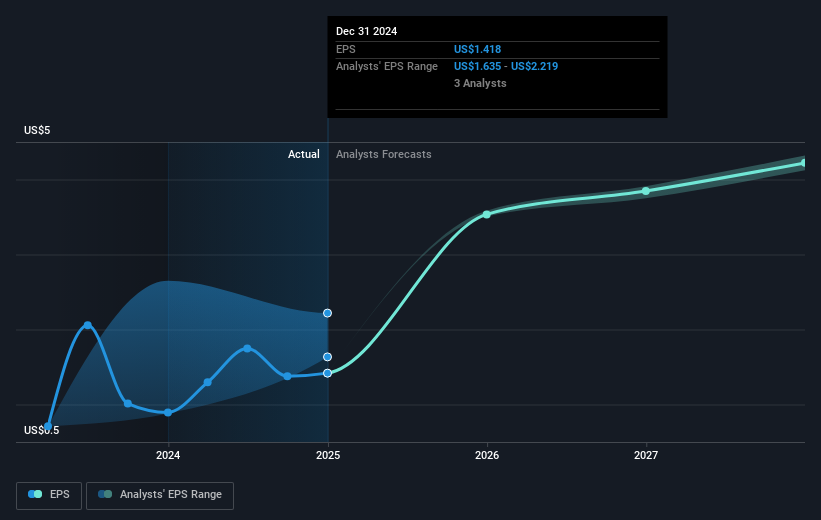- United States
- /
- Interactive Media and Services
- /
- NasdaqGS:ZD
The three-year shareholder returns and company earnings persist lower as Ziff Davis (NASDAQ:ZD) stock falls a further 14% in past week

If you are building a properly diversified stock portfolio, the chances are some of your picks will perform badly. Long term Ziff Davis, Inc. (NASDAQ:ZD) shareholders know that all too well, since the share price is down considerably over three years. So they might be feeling emotional about the 66% share price collapse, in that time. And over the last year the share price fell 43%, so we doubt many shareholders are delighted. The falls have accelerated recently, with the share price down 39% in the last three months.
Since Ziff Davis has shed US$219m from its value in the past 7 days, let's see if the longer term decline has been driven by the business' economics.
While the efficient markets hypothesis continues to be taught by some, it has been proven that markets are over-reactive dynamic systems, and investors are not always rational. One way to examine how market sentiment has changed over time is to look at the interaction between a company's share price and its earnings per share (EPS).
During the three years that the share price fell, Ziff Davis' earnings per share (EPS) dropped by 45% each year. This fall in the EPS is worse than the 30% compound annual share price fall. This suggests that the market retains some optimism around long term earnings stability, despite past EPS declines.
You can see how EPS has changed over time in the image below (click on the chart to see the exact values).

It's good to see that there was some significant insider buying in the last three months. That's a positive. On the other hand, we think the revenue and earnings trends are much more meaningful measures of the business. It might be well worthwhile taking a look at our free report on Ziff Davis' earnings, revenue and cash flow .
A Different Perspective
While the broader market lost about 2.4% in the twelve months, Ziff Davis shareholders did even worse, losing 43%. Having said that, it's inevitable that some stocks will be oversold in a falling market. The key is to keep your eyes on the fundamental developments. Unfortunately, last year's performance may indicate unresolved challenges, given that it was worse than the annualised loss of 8% over the last half decade. Generally speaking long term share price weakness can be a bad sign, though contrarian investors might want to research the stock in hope of a turnaround. While it is well worth considering the different impacts that market conditions can have on the share price, there are other factors that are even more important. Even so, be aware that Ziff Davis is showing 1 warning sign in our investment analysis , you should know about...
If you like to buy stocks alongside management, then you might just love this free list of companies. (Hint: most of them are flying under the radar).
Please note, the market returns quoted in this article reflect the market weighted average returns of stocks that currently trade on American exchanges.
Valuation is complex, but we're here to simplify it.
Discover if Ziff Davis might be undervalued or overvalued with our detailed analysis, featuring fair value estimates, potential risks, dividends, insider trades, and its financial condition.
Access Free AnalysisHave feedback on this article? Concerned about the content? Get in touch with us directly. Alternatively, email editorial-team (at) simplywallst.com.
This article by Simply Wall St is general in nature. We provide commentary based on historical data and analyst forecasts only using an unbiased methodology and our articles are not intended to be financial advice. It does not constitute a recommendation to buy or sell any stock, and does not take account of your objectives, or your financial situation. We aim to bring you long-term focused analysis driven by fundamental data. Note that our analysis may not factor in the latest price-sensitive company announcements or qualitative material. Simply Wall St has no position in any stocks mentioned.
About NasdaqGS:ZD
Ziff Davis
Operates as a digital media and internet company in the United States and internationally.
Flawless balance sheet and fair value.
Similar Companies
Market Insights
Community Narratives


